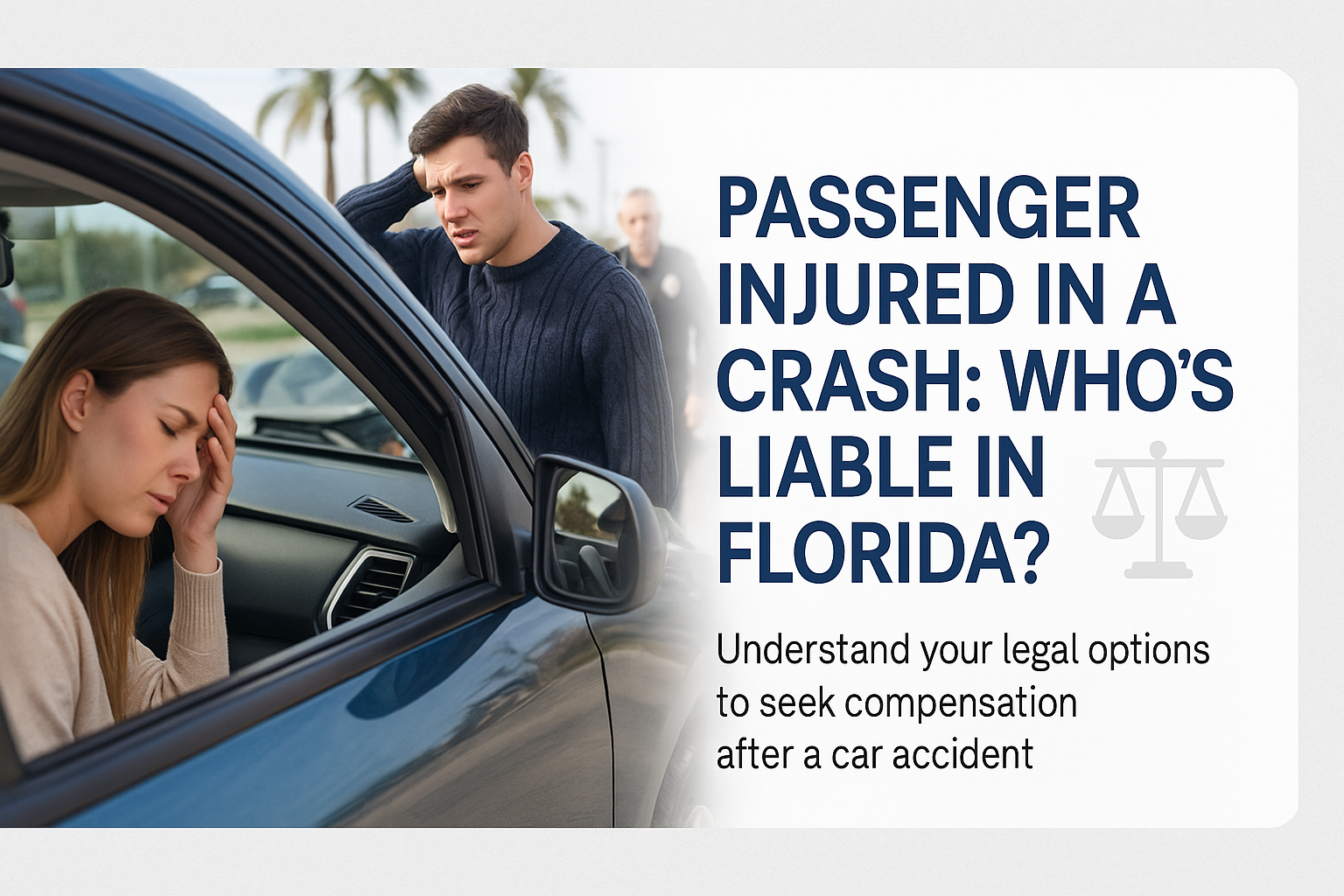Car accidents are frightening for everyone involved, but for passengers, the aftermath can be particularly confusing. Unlike drivers, passengers have no control over the vehicle, yet they may suffer serious injuries and face mounting medical bills. In Florida, understanding your legal rights as an injured passenger is essential to securing the compensation you need to recover.
This guide breaks down how liability is determined when a passenger is hurt in a crash, what options are available for recovery, and how Florida’s unique laws affect your ability to file a claim.
Are Passengers Ever Liable for an Accident?
In almost all cases, passengers are considered innocent parties. They are not operating a vehicle and are rarely in a position to influence the cause of a collision. This makes passengers eligible to file claims against one or more at-fault parties, depending on the details of the crash.
However, there are very limited exceptions. For example, if a passenger interfered with the driver’s ability to control the vehicle, liability could become a factor. These scenarios are rare, and most injured passengers should feel confident in pursuing legal action.
Who Can Be Held Liable for a Passenger’s Injuries?
The answer depends on how the accident occurred. Florida follows a modified comparative negligence system, which means liability can be shared across multiple parties. Here’s a breakdown of who may be responsible:
1. The Driver of the Vehicle You Were In
If your driver was speeding, ran a red light, or was distracted at the time of the crash, they may be found at fault. As a passenger, you have the right to file a claim against their insurance, even if you know them personally.
2. Another Driver Involved in the Crash
In multi-vehicle or T-bone collisions, another driver may be partially or fully responsible. You may be able to pursue a claim against their insurance provider.
3. Both Drivers
In chain-reaction crashes or cases of shared negligence, you can file claims with both insurance companies to pursue full compensation. Florida law allows for this when multiple parties contribute to an accident.
For more on these situations, see Who Is Responsible in Multi-Car Pileups?
Florida’s Modified Comparative Negligence Rule
As of March 2023, Florida follows a modified comparative negligence standard. This rule means that:
- You can recover damages only if you are less than 50% at fault for the accident.
- For passengers, this generally supports your claim, since you’re unlikely to be found at fault.
- However, the total compensation can be reduced if your actions contributed to your injuries (e.g., not wearing a seatbelt).
For a detailed breakdown of how this rule affects all injury claims, visit Florida’s Comparative Negligence Law: What It Means for Your Injury Claim.
Steps to Take if You’re an Injured Passenger
In the chaos following a crash, it’s easy to feel overwhelmed. But these actions can make a significant difference in your legal case:
- Seek Medical Attention Immediately
Some injuries take hours or even days to become fully apparent. Don’t delay care. - Request the Police Report
This will help clarify which driver may be at fault and provide valuable details for your claim. - Collect Insurance Information from All Drivers
You are not limited to filing with just one insurer. Multiple policies may apply. - Avoid Giving Statements to Insurance Adjusters Without Legal Advice
Insurers may try to minimize your compensation or unfairly shift blame. - Contact a Personal Injury Attorney
A Boca Raton car accident lawyer can help identify the responsible parties, deal with the insurers, and file your claim on time.
Does PIP Insurance Cover Injured Passengers in Florida?
Florida is a no-fault state, which means all drivers are required to carry Personal Injury Protection (PIP) coverage. If you’re injured as a passenger, you may be covered under:
- Your own PIP policy
- The policy of the driver of the car you were in
However, PIP coverage only provides up to $10,000 in medical and lost wage benefits, which often falls far short in serious injury cases. That’s why pursuing a bodily injury liability claim against the at-fault party is so important.
To better understand the limits of PIP, see this helpful overview from the Florida Office of Insurance Regulation.
Why You Need a Lawyer After a Passenger Injury
Even though passengers are typically not at fault, insurance companies don’t always offer fair compensation without a fight. A personal injury attorney can help by:
- Investigating who is liable
- Filing claims with the appropriate insurers
- Ensuring your case complies with Florida’s 2-year statute of limitations
- Maximizing the value of your claim through negotiation or litigation
At Silver Injury Law, we understand the emotional and physical toll an accident can take, especially when you’re not the one behind the wheel. We’re here to handle the legal process so you can focus on healing.
Schedule a Free Consultation
If you’ve been injured as a passenger in a Florida car accident, don’t wait to get the help you deserve. Contact Silver Injury Law today for a free consultation and let us fight for the compensation you need to move forward.




